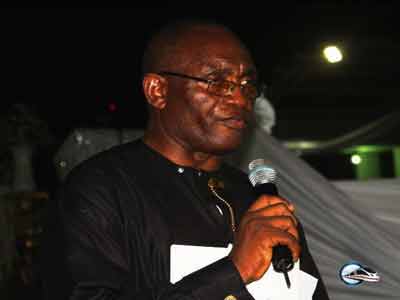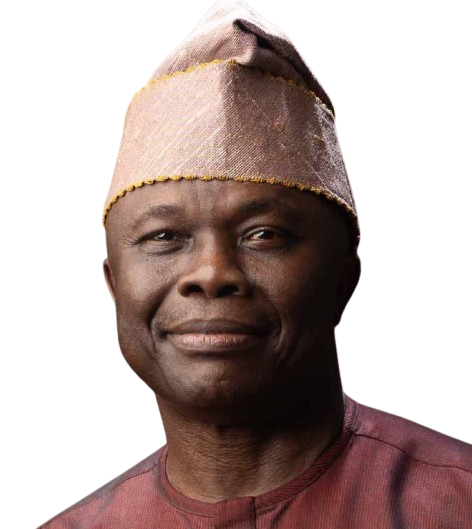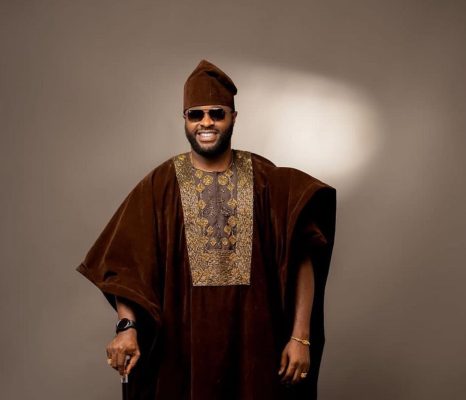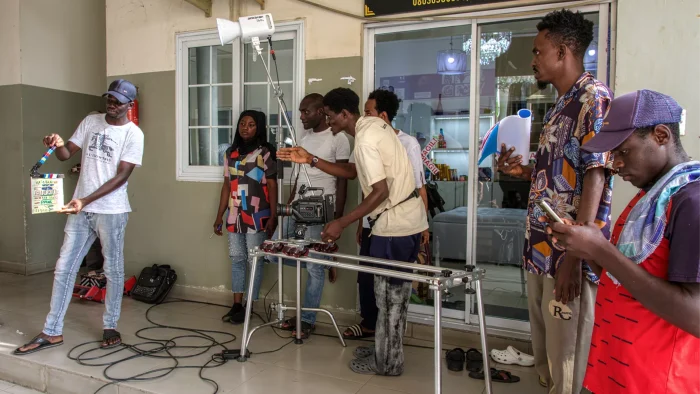- The business of storytelling: Ruth Kadiri on why Nollywood must invest in structure, not just stars
- SHOW DEM CAMP: Afrika Magik, Nollywood Nostalgia, and Conceptual Hip Hop
- TikTok Awards Sub-Saharan Africa: A celebration of a continent’s new creative power
- Edinyanga Uko & Itoro Okopide: Redefining cultural luxury one business at a time
Blessed be she who is both furious and magnificent” – Taylor Rhodes.
The journey of a thousand miles begins with one step. For Ann-Kio Briggs every step she takes is geared towards restoring the Niger Delta. A story made from the circumference of a crescent which revolves around the exploration of oil, the activities of the militants and the devastation afterwards.
A community betrayed
The playground is gone. Briggs came back from life in England in 1998 to a community she barely recognised and desperately sought to resolve this. Painting a picture of the life she knew, “When people had swings and seesaws to play with, I had the canoes, boats, mangroves and the creek. The clear crystal water and the sand was my playground. As a little girl I used to go to the riverbank and put a bottle in the water and bring it out with little silver fi shes in it and I would keep them for days,” she says. This is a story Briggs paints for her children who never got to see this Niger Delta or eat fresh fish from the river, look at the waterside, play on the riverbanks and live in youthful exuberance. She speaks with nostalgia on how their euphoria turned to a nightmare. “They (the water, mangroves and creek) have been destroyed by the oil companies in collaboration with the federal government. They have destroyed our livelihoods, our soil, our water and what keeps us alive. The environment is our life and they have destroyed it,” she says.
shes in it and I would keep them for days,” she says. This is a story Briggs paints for her children who never got to see this Niger Delta or eat fresh fish from the river, look at the waterside, play on the riverbanks and live in youthful exuberance. She speaks with nostalgia on how their euphoria turned to a nightmare. “They (the water, mangroves and creek) have been destroyed by the oil companies in collaboration with the federal government. They have destroyed our livelihoods, our soil, our water and what keeps us alive. The environment is our life and they have destroyed it,” she says.
According to a United Nations report released on the 4th of August 2011, “In one community, Nisisioken Ogale, near a Nigerian National Petroleum Company pipeline, families are drinking water from wells contaminated with benzene, a known carcinogen, at levels over 900 times above UN World Health Organization (WHO) guidelines, warranting emergency action ahead of all other remediation efforts.” To this, Briggs says people are suffering from diseases unknown, no health analyses have been done on the effect of the pollution on any ethnic group in the Niger Delta. Having lived in the Niger Delta most of her life, Briggs admits that she has respiratory diseases and skin issues as a result of the pollution. To expatiate on the stages of abuse the people face she says, “The military say that they are stopping people from doing crude refining but basically their method is illegal. Imagine the devastation? Apart from the pollution caused by the oil and gas companies in collaboration with the federal government, the same government through the military are now burning this product and we are living with this, breathing it in, it’s in the food we eat, it’s in the air.”

A life of activism
Many hear the clarion call but few answer. Briggs did. “I really didn’t even know that what my heart was telling me to do was activism. I was just reacting to what I know to be injustice as a human being,” she says explaining that she was raised to resolve conflicts logically, she showed this attribute on the playground as a kid and when she returned to an altered landscape. “My desire to resist what was happening developed from there, I just made a decision when Ken Saro Wiwa was murdered that I will get involved and from 1998 I devoted my time, effort and everything to this cause.”
Briggs started Agape Birthrights which started out as a non-governmental, environmental rights organisation but has evolved into simply a rights organisation. “The love God (agape love) has for us is our birthright which means all the good things that come from God are our birthright which includes our environment, justice, equity and truth and if those things are from God and what I know my people have in the Niger Delta is the opposite then I am inspired to stand up and fight for these things.”
From the inception of Agape Birthrights, Briggs has found out about other rights that have been infringed. Basic human rights recognised  by the United Nations and the African Charter of Human and Peoples’ Rights like the right to an adequate standard of living have been taken from these families. They cannot grow food because of the soil, or fish because of the water. Briggs wants the environment and lifestyle of the Niger Delta back. “The government have failed the people of the Niger Delta and in a way [we] the people of the Niger Delta have failed ourselves because we have not really made a decision to fight this injustice and take it to a logical conclusion,” she added.
by the United Nations and the African Charter of Human and Peoples’ Rights like the right to an adequate standard of living have been taken from these families. They cannot grow food because of the soil, or fish because of the water. Briggs wants the environment and lifestyle of the Niger Delta back. “The government have failed the people of the Niger Delta and in a way [we] the people of the Niger Delta have failed ourselves because we have not really made a decision to fight this injustice and take it to a logical conclusion,” she added.
Aligning her views with the International Women’s Day 2017 campaign theme: #BeBoldForChange, she says, “If you are agitating for something, you must be bold and courageous and what we want is change for what is rightfully ours and that is what I want. We are being destroyed in the name of one Nigeria, we are being called upon to make sacrifices no other region has been called upon to make.” She is grieved by what she calls a “death sentence” and states that, “If the price to pay for “One Nigeria” is the destruction of my people, community and the abuse of my rights then I really don’t want to be a part of it. The Niger Delta doesn’t belong to anybody, we just happen to be in Nigeria and if we weren’t in Nigeria, then what claim would Nigeria have on the Niger Delta? Absolutely none.”
It is already a chore to be a woman, but to be a woman who speaks up and loud in the face of danger is to challenge the status quo. Briggs enlightens us on the misogynistic culture and its effect on her work. In a book written by fellow activists The Emperor is Naked and published by the Environmental Rights Action, Briggs contributes to one of the chapters saying, “women are in a struggle within a struggle”. She came to this conclusion when she started her work as an activist and her gender came before her capability. “It is really a pity that we are held back by culture. I am in no way against culture, I love culture but we must not allow culture to hold us back and unfortunately in Nigeria that has happened.” She aims to work with men and be respected because of the work she does as she doesn’t see herself to be in competition with them.
The impact her organisation has had in the Niger Delta is in creating awareness. Being an organisation that primarily disseminates information on healthcare, education of civil rights, political rights and basically working with people to get justice and equity, they have worked on cases like Ese Oruru: State vs Yunusa – the abducted Bayelsa-born teenage girl who was carried to Kano state to marry her abductor. They are tackling the root issue of the mindset. Briggs says, “Even if it is a hundred people that become aware and are willing to get up and fight (to agitate for equity and justice through intellectual discourse, discussion and negotiation) for their rights [it] is better than having none at all.”
Activist not militant
Some people have accused Briggs of being a militant but contrary to that she affirms that she is not a militant as she doesn’t carry guns or believe in violence. She says she believes in changing the mindset of using violence as a means to an end. On the issues of affiliation she says: “Are there people I know who ended up becoming militants? Of course. Am I part of what they are doing? Of course not. Do I understand why they are doing what they are doing? Yes I do. Am I going to condemn them? No I will not, I will not condemn anybody, if we won’t condemn the oil companies or the federal government then we won’t condemn them.” Being diplomatic she states, “I cannot pretend that what they are saying is not more or less the same thing I’m saying which is fighting for justice and equity. If they don’t condemn me for being nonviolent then I won’t condemn them for being violent, I will however continue to appeal to them to follow the path of negotiation and dialogue to achieve what we want.”
Highlighting her major obstacle in her quest for restoration as some politicians and people who benefit indirectly from the injustice she is fighting against, she says they are ruled by selfishness, greed and sometimes the fear of losing what they think they have. She debunks their selfish interest as she explains, “By respecting and supporting what I’m doing, they are bound to gain much more than what they think they are going to lose.” This woman of valour has been put in the face of danger and to that she says, “I cannot deny that they (my family) are at risk, I have done things that have placed my family at some level of risk, me much more.” Her last encounter with danger was as recently as February this year, when, during a love march in Bayelsa to speak against the allocation of land to the Fulani herdsmen, the march reportedly came under attack from thugs but Briggs is undeterred. “I will not allow fear hold me back,” she says. “The previous attack is not the first one but I hope it is the last one. We must do what is right and believe that God would protect us in that process and justice must come to all, be it in the Niger Delta or the North.”








